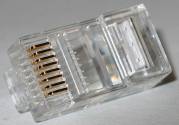

RJ45 connectors are probably the most widely known – and widely used – network connectors out there. Even if you know nothing about network connection or cabling, it's a fair bet that you have at least two RJ45s in your house. Here's a beginner's guide to what they're all about, and how they're used.
Sources:


The original RJ45 connector doesn't actually exist anymore – which might make the paragraph above seem a little bizarre – the 8 pin modular connector that originally carried the name RJ45 was used for telephone connections and high speed modems, which are no longer used.
However, a similar 8 pin design was used for basic Ethernet connections around thirty years ago, and these types of cables which would more correctly be called 8P8C (standing for 8 Position 8 Conductor – a reference to the makeup of the cable) ended up adopting the name RJ45. You can check an online store like RS Components for all your RJ45 (or indeed 8P8C) needs.
RJ45 connectors today, then, are used to connect to Ethernets and LANs. That means if you have wired internet and a broadband modem somewhere, the cable that is connecting your computer to the network is almost certainly an RJ45. The 8 pin design is excellent for information exchange, hence the success of the RJ45 for networking and in recent years the copper interiors have been replaced with fibre optics, essentially making the connection from your broadband hub to your computer instantaneous.
These cables can also be used for quick connections between other devices (primarily computers and printers as was the original setup of Ethernet). However, in recent years, USB has appeared as a successful alternative, and in the last few years wireless connectivity has replaced the networking cables.
However, the RJ45 is not about to disappear. Firstly, it's far too wide-spread, and secondly cabled connections remain an attractive option for desktops and in many offices. A transition to a wireless network might happen one day, but at present they're not well-suited to having millions of desktops operating through them 24/7. Secondly, private Local Area Networks (LANs – networks that are often closed and join several different devices together) are infinitely more secure than wireless networks, so if you want several devices to be connected (although not with the internet) RJ45 is your best, quickest option.
| file: /Techref/rj45.htm, 3KB, , updated: 2012/1/26 19:04, local time: 2025/6/17 12:43,
216.73.216.205,10-3-86-203:LOG IN
|
| ©2025 These pages are served without commercial sponsorship. (No popup ads, etc...).Bandwidth abuse increases hosting cost forcing sponsorship or shutdown. This server aggressively defends against automated copying for any reason including offline viewing, duplication, etc... Please respect this requirement and DO NOT RIP THIS SITE. Questions? <A HREF="http://www.sxlist.com/techref/rj45.htm"> RJ45 Connector Cable Components</A> |
| Did you find what you needed? |
Welcome to sxlist.com!sales, advertizing, & kind contributors just like you! Please don't rip/copy (here's why Copies of the site on CD are available at minimal cost. |
|
The Backwoods Guide to Computer Lingo |
.